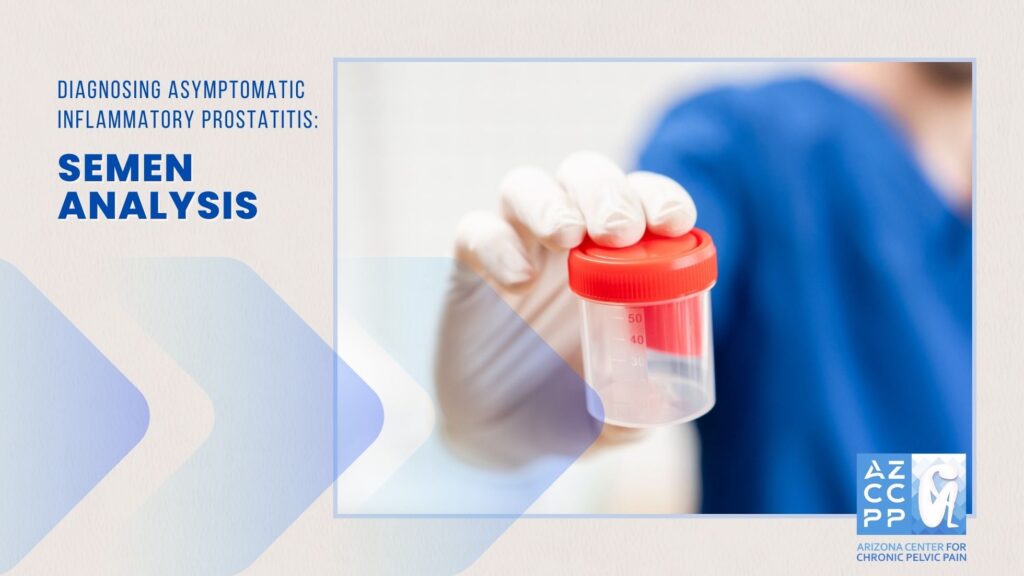Asymptomatic Inflammatory Prostatitis (AIP) represents a complex condition often diagnosed incidentally during evaluations for other urogenital disorders. While the absence of symptoms challenges its detection, a meticulous semen analysis offers significant insights into the inflammatory status of the prostate. This article explores the diagnostic value of semen analysis in detecting AIP, underlining its relevance in modern urological practice.
Understanding Asymptomatic Inflammatory Prostatitis
Asymptomatic Inflammatory Prostatitis is classified under Category IV prostatitis by the National Institutes of Health (NIH). This condition is characterized by the presence of leukocytes in prostatic secretions, semen, or urine, without accompanying clinical symptoms. Despite its asymptomatic nature, AIP is associated with potential long-term consequences, including male infertility and chronic pelvic pain. The silent progression of AIP underscores the importance of routine diagnostic procedures, particularly in patients undergoing evaluation for other fertility or urological concerns.
Diagnosing AIP: The Role of Semen Analysis in Prostate Health
Semen analysis is a vital tool traditionally employed for evaluating male fertility, but its application extends beyond this scope to include the assessment of prostatic inflammation. This analysis is instrumental in identifying inflammatory changes in the prostate, providing critical insights into conditions such as Asymptomatic Inflammatory Prostatitis (AIP).
-
Leukocytospermia as a Diagnostic Marker
One of the key indicators of prostatic inflammation identified through semen analysis is leukocytospermia, which is characterized by the presence of more than 1 million white blood cells per milliliter of semen. Leukocytospermia is a significant marker of prostatitis, suggesting an inflammatory process within the prostate. This condition often prompts further diagnostic evaluation to ascertain the underlying cause. In addition to indicating inflammatory prostatitis, leukocytospermia can be associated with other seminal abnormalities, such as diminished sperm motility and altered sperm morphology. These abnormalities can adversely affect male fertility. Thus, the detection of leukocytospermia necessitates a thorough urological assessment to explore potential causes, including AIP.
-
Inflammatory Markers in Semen
In addition to leukocytes, pro-inflammatory cytokines present in semen offer valuable diagnostic information regarding the inflammatory status of the prostate. Key cytokines, such as interleukin-6 (IL-6), interleukin-8 (IL-8), and tumor necrosis factor-alpha (TNF-α), are often elevated in the presence of prostatitis. These cytokines contribute to the inflammatory milieu within the prostate, leading to potential disruptions in normal sperm function. Elevated levels of these markers not only aid in diagnosing prostatic inflammation but also help in differentiating between various types of prostatitis, including AIP. Their measurement adds a crucial dimension to the diagnostic process, facilitating a more comprehensive understanding of the inflammatory condition.
-
Microbiological Examination of Semen
Microbiological examination of semen is another essential aspect of semen analysis, focusing on detecting the presence of bacterial or other microbial pathogens. Although AIP is typically nonbacterial, the identification of bacterial DNA or specific pathogens in semen can indicate a bacterial cause of the inflammation. Microbiological cultures can reveal pathogens such as Escherichia coli, Enterococcus faecalis, and other uropathogens that may contribute to prostatitis. The detection of these pathogens in asymptomatic individuals is crucial as it guides the clinician towards appropriate antimicrobial treatments, thereby addressing potential chronic infections and preventing further complications.
As such, semen analysis provides a multifaceted approach to understanding prostatic health. By identifying leukocytospermia, measuring inflammatory cytokines, and conducting microbiological examinations, clinicians can gain valuable insights into the inflammatory processes affecting the prostate and tailor their diagnostic and therapeutic strategies accordingly.
Clinical Implications of Semen Analysis in AIP Diagnosis
The application of semen analysis in diagnosing Asymptomatic Inflammatory Prostatitis (AIP) provides significant clinical benefits. By detecting subtle inflammatory changes, clinicians can identify AIP early, potentially preventing its progression to more severe forms of prostatitis. Additionally, semen analysis plays a crucial role in assessing male fertility, particularly in cases of unexplained infertility. Through targeted treatment based on semen analysis findings, clinicians can improve reproductive outcomes and overall patient well-being.
-
Early Detection and Intervention
The asymptomatic nature of AIP poses a challenge for early detection, making routine semen analysis indispensable. For men undergoing fertility evaluations or those presenting with urogenital symptoms, semen analysis can reveal subclinical inflammation. Early detection through this analysis allows for timely intervention, which is critical in preventing the development of chronic prostatitis or other related conditions. This proactive approach not only addresses the current inflammation but also reduces the risk of long-term complications, thereby improving patient management and health outcomes.
-
Impact on Male Fertility
Inflammation in the prostate has a profound impact on sperm quality, which can lead to reduced fertility. The presence of inflammatory markers in semen, such as elevated leukocytes and pro-inflammatory cytokines, is associated with impaired sperm function. Men with AIP may exhibit reduced sperm motility, abnormal sperm morphology, and increased DNA fragmentation, all of which contribute to infertility. Addressing the underlying inflammation through appropriate therapeutic interventions can significantly enhance sperm quality and improve fertility outcomes. By targeting inflammation, clinicians can help restore normal sperm function and increase the likelihood of successful conception.
-
Guiding Treatment Strategies
The results from semen analysis are instrumental in shaping treatment strategies for AIP. Detection of bacterial pathogens in semen may necessitate targeted antibiotic therapy, while nonbacterial cases may benefit from anti-inflammatory agents or other supportive treatments. The insights gained from semen analysis enable personalized management of prostatitis, ensuring that therapies are tailored to the specific inflammatory profile of the patient. This individualized approach enhances treatment efficacy, optimizes patient outcomes, and provides a comprehensive strategy for managing AIP.
In summary, semen analysis offers substantial clinical advantages in the diagnosis and management of AIP. By facilitating early detection, improving fertility outcomes, and guiding targeted treatment strategies, this diagnostic tool proves essential in addressing prostatic inflammation and enhancing patient care.
Conclusion
The diagnosis of Asymptomatic Inflammatory Prostatitis presents a unique challenge due to the absence of overt symptoms. However, the utilization of semen analysis as a diagnostic tool offers a non-invasive and effective means of detecting this condition. By focusing on key indicators such as leukocytospermia, inflammatory markers, and microbiological findings, clinicians can accurately diagnose AIP, paving the way for early intervention and improved patient outcomes. As our understanding of prostatic inflammation continues to evolve, semen analysis remains an indispensable component of urological practice, offering valuable insights into the health of the prostate and its impact on male fertility.
READ MORE: On Men’s Health: What Is Asymptomatic Inflammatory Prostatitis
On Men’s Health: What Is Asymptomatic Inflammatory Prostatitis
Contact Us for Chronic Pelvic Pain Treatment for Men

If you’re experiencing symptoms of Asymptomatic Inflammatory Prostatitis or AIP, don’t delay seeking medical attention. Contact the Arizona Center for Chronic Pelvic Pain for expert diagnosis and personalized treatment. Our experienced team specializes in managing pelvic pain conditions and can provide the care you need to feel better. Call us at (480) 599-9682 or email [email protected] to schedule an appointment.
AZCCPP offers comprehensive evaluation, personalized treatment plans, and compassionate care to help you find relief. Contact us today at (480) 599-9682 or [email protected] to schedule an appointment. You may also check out AZCCPP on YouTube for more questions that need answers with Dr. Michael Hibner.
By understanding the symptoms, causes, diagnosis, and treatment options for Asymptomatic Inflammatory Prostatitis, you can take proactive steps to manage this condition effectively and regain your quality of life.

